BMA Foundation for Medical Research – grant winners 2025
Find out about the winners of the 2025 grant round and their projects by clicking through the tabs below.
-
Dawkins & Strutt grant to assist research into gender and race bias in clinical decision making in healthcare


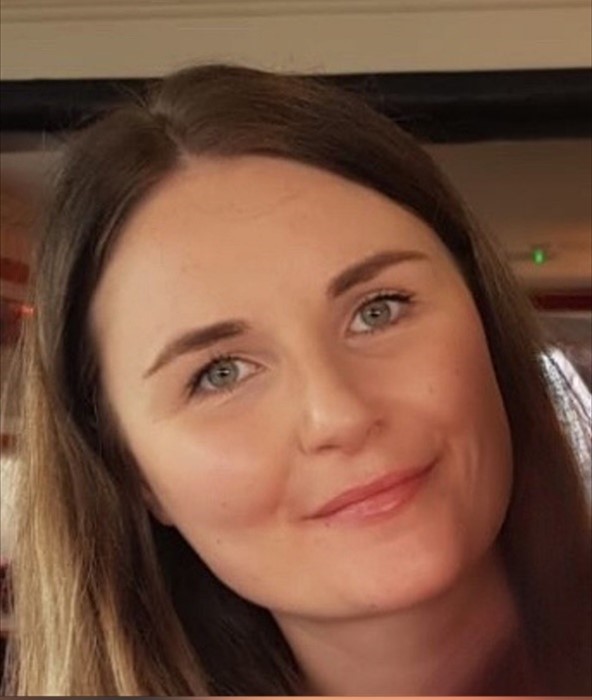

Dawkins & Strutt
To assist research into gender and race bias in clinical decision making in healthcare
Mrs Melissa Barlow, University of Exeter
Ethnic and gender disparities in blood testing rates and cancer diagnosis
Black and Asian women are more likely to be diagnosed with some cancers at a later stage than other demographic groups, contributing to poorer outcomes and higher mortality rates. Primary care presents a vital opportunity for earlier cancer detection, and routine blood tests (such as the full blood count) play a key role in supporting GPs with cancer referral decisions.
Our recent research found the distribution of several common primary care blood tests varies by ethnicity, and that the predictive value of abnormal results for cancer incidence also differs. These disparities may influence the timeliness of cancer diagnoses. Engagement with underserved ethnic communities suggests these variations are likely shaped by a complex interplay of socioeconomic, cultural, and religious factors, particularly for women who often face distinct, intersectional barriers in accessing care and undergoing diagnostic testing.
This study is the first to systematically investigate whether there are disparities in the rates at which different ethnic groups undergo primary care blood testing, and how these inequalities affect early cancer detection, incorporating both sex and socioeconomic status into its analyses. This study will raise critical questions that extend beyond cancer diagnosis to broader patterns of primary care engagement.
-
Doris Hillier grant to assist research into rheumatism and arthiritis




Dr Natalie Shur, University of Nottingham
Investigating mechanisms of knee pain improvement in individuals with obesity undergoing weight loss: A pilot study on radiological, metabolic, and intra-articular microenvironment changes
Dr Natalie Shur’s pilot study investigates how weight loss improves knee pain in people with obesity and osteoarthritis (OA), focusing on changes in joint structure, inflammation, and muscle composition. While weight loss is known to significantly reduce pain, the exact mechanisms, whether mechanical (reduced joint loading) or metabolic (inflammation and lipid signalling), remain unclear. This research will assess both concurrently, using advanced MRI techniques to measure cartilage thickness and joint strain, alongside blood and synovial fluid analysis to track inflammatory and metabolic biomarkers.
Participants will include individuals with obesity and knee OA enrolled in a 12-week weight loss programme using GLP-1 receptor agonists, and matched controls not undergoing weight loss. The study will also evaluate changes in muscle quality, intramuscular fat, joint inflammation, and knee pain. This is the first study to combine such detailed metabolic and biomechanical measurements in this context.
Findings could shape future non-surgical treatments for knee OA, particularly for patients awaiting surgery, by identifying novel therapeutic targets. Dr Shur’s work leverages world-class imaging and musculoskeletal research facilities at the University of Nottingham, aiming to drive meaningful improvements in the care of people living with chronic knee pain.
-
H C Roscoe grant to assist research into the elimination of the common cold and/or other viral diseases of the human respiratory system





Dr Jonathan Broad, Croydon Hospital
Evaluating RSV immunity amongst infants born prematurely and based on timing of maternal vaccination
Every year, the respiratory syncytial virus (RSV) causes about 33 million lung infections and over 100,000 deaths in children under five years old. A new vaccine called Abrysvo, given to pregnant women, has been shown to reduce the risk of severe RSV infections in newborns by over 80%. However, it's not yet clear how well this protection works for premature babies or when during pregnancy the vaccine works best.
This study aims to find out how well the RSV vaccine protects babies—especially those born early—and whether the timing of the vaccine during pregnancy makes a difference.
272 families will be invited from the Born and Bred in (BaBi) study to take part in an extra part of the research. These families will be divided into four groups:
- Babies whose mothers got the RSV vaccine before 32 weeks of pregnancy
- Babies whose mothers got the RSV vaccine after 32 weeks
- Premature babies whose mothers were vaccinated
- Babies whose mothers were not vaccinated
A small blood sample will be taken from the babies at birth and again at six months to measure their levels of RSV-fighting antibodies.
NHS health records will also be monitored to see how many of these babies were admitted to hospital or needed intensive care in their first two years of life, depending on whether and when their mothers were vaccinated.
This study will help us understand the best time during pregnancy to give the RSV vaccine, and whether it protects premature babies as well as full-term babies. Both lab tests and health data will be used to get a full picture of how well the vaccine works.
-
Helen H Lawson grant for research into women's health and wellbeing

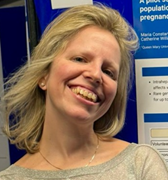


Dr Julia Zollner, Institute for Women’s Health, University College London and Dr Sara White, Kings College London
Using genomics to predict type 2 diabetes after gestational diabetes.
Gestational diabetes is a type of diabetes that develops during pregnancy and affects around 10% of pregnancies in the UK each year — approximately 66,000 women, the same number of people living in a large town like Guildford. While gestational diabetes often resolves after childbirth, women who experience it are significantly more likely to develop type 2 diabetes later in life. This poses long-term health risks for both mothers and their families.
Not every individual who has experienced gestational diabetes will develop type 2 diabetes however, and it is for this reason that our research aims to improve how we predict which women are most at risk. Early identification of high-risk individuals could enable timely interventions that prevent or delay the onset of type 2 diabetes in those that require it most - ultimately improving outcomes for both mothers and their children.
To achieve this, we are using data from the UK Biobank, a large-scale biomedical resource containing health, lifestyle, genetic, proteomic, and metabolomic information from over half a million participants. We will identify women who had gestational diabetes and those who did not, and examine their pregnancy histories, health records, and molecular profiles.
Integrated risk analysis will be performed to assess whether specific combinations of genetic, metabolic, and protein biomarkers can predict who is more likely to develop type 2 diabetes after pregnancy. The final goal is to create a predictive tool that combines these data with routine clinical information to better identify women at high risk. This tool will be tested to assess its accuracy and real-world application.
The Helen H Lawson grant from the BMA Foundation will enable them to carry out this important work. By leveraging cutting-edge biomolecular data, this research has the potential to revolutionise early diabetes prediction and prevention for young at-risk individuals. It could lead to personalised interventions that improve long-term health outcomes for women and their families - with real-world benefits achievable in just a few years.
-
Josephine Landsell grant to assist research into heart disease




Dr Lukas Mach, Imperial College London
Prediction of recovery and treatment response in dilated cardiomyopathy
Dilated cardiomyopathy (DCM) is a leading cause of heart failure and sudden cardiac death, particularly in younger adults. Although many patients benefit from existing treatments, others experience progressive deterioration with no current way to reliably predict who will respond and who won’t.
This research, supported by the BMA Foundation, investigates the biological underpinnings of treatment response in DCM by combining cutting-edge molecular techniques with detailed clinical data. It focuses on analysing heart tissue transcriptome at single cell resolution to identify patterns that distinguish recovery from non-recovery. The goal is to generate insights that could ultimately support more accurate diagnosis, prognosis, and targeted interventions for patients with cardiomyopathy.
Dr Mach’s work aspires to bring together expertise in cardiology, transcriptomics, imaging, and translational research. By bridging clinical cardiology and advanced tissue profiling, the project aims to pave the way for more personalised and effective care in heart failure.
-
Kathleen Harper to assist research into the treatment and management of incontinence



Dr Christopher Bannon, Institute of Metabolic Science, University of Cambridge
Targeting gut hormone INSL5 to treat chronic diarrhoea and incontinence
When assessing chronic diarrhoea in the clinic, patients will typically be investigated for an infective, inflammatory or autoimmune cause. Gut hormones, however, remain underexplored as contributors to symptoms.
Dr Bannon’s PhD focused on the understudied gut hormone, insulin-like peptide 5 (INSL5), which is expressed in the distal colon and rectum. Pre-clinical studies have highlighted it can be secreted by bile acids and generates a defecation response, which can be inhibited by the anti-emetic ondansetron.
In our recent publication in Gut, we produced the first data of INSL5 levels in patients with chronic diarrhoea. We demonstrated that INSL5 is low in healthy volunteers but promptly rises when the rectum is exposed to bile acids. Importantly, we observed elevated INSL5 in patients with bile acid diarrhoea—a common yet underdiagnosed condition affecting ~1% of the population—and that INSL5 levels correlate with diarrhoea severity. They also identified a subgroup of patients with irritable bowel syndrome with diarrhoea who had elevated INSL5 levels and who experienced symptomatic improvement with ondansetron.
This grant aims to validate INSL5 as a biomarker for targeted treatment of chronic diarrhoea and incontinence using ondansetron. They will also explore other stool metabolites that stimulate INSL5 release and further define its role in gut motility.
-
Margaret Temple grant to assist research into schizophrenia



Mr Vid Mlakar and Dr Elise Halff, Kings College London
Telomere length in psychosis - a longitudinal study
People with psychotic disorders like schizophrenia suffer from ageing-related disorders and have a life expectancy roughly 15 years shorter than the general population. They also possess shorter telomeres, which are regions at the end of all chromosomes that protect the DNA from deterioration and serve as a measure of biological ageing. Telomeres shorten during natural ageing, but their length is also affected by stress exposure and lifestyle.
It is currently unknown whether telomere shortening is faster in schizophrenia patients, and how stress, lifestyle, and genetic factors contribute to telomere attrition rates and accelerated biological ageing in this group. This team has collected extensive clinical and environmental data from 289 patients with first-episode psychosis and 106 healthy controls followed up for five years. The BMA Margaret Temple award will enable them to measure telomere length from these participants in samples taken five years apart. This will allow them to link telomere attrition rates to environmental aspects such as life stressors and health behaviours. Identifying factors that affect telomere attrition over time will support the development of new treatments. This work will be conducted together with, and in the lab of, Dr Monica Aas.
-
J Moulton grant to advance diagnostic and screening tools in ophthalmology




Professor Simon Walker-Samuel, Centre for Computational Medicine, University College London and Dr Emmeline Brown, University College London
Integrating imaging, computational modelling and deep generative learning
Emmeline Brown and Simon Walker-Samuel are based at the UCL Centre for Computational Medicine, and specialise in the integration of advanced computational modelling with cutting-edge imaging in order to transform our understanding of human health and disease. A central research focus is the modelling of the human retina, where they use high-resolution, multimodal imaging to create digital twins that capture retinal structure and function at an unprecedented level of detail. These models enable researchers to simulate individual physiological responses and disease trajectories, providing crucial insight into complex conditions such as diabetic retinopathy. This approach supports the identification of early biomarkers, optimises screening strategies, and guides the development of personalised therapies. Alongside their work on the retina, they also develop mathematical mechanistic and data-driven models of cancer that predict tumour growth, progression and response to therapy. By integrating imaging, mechanistic modelling and clinical data, these models help to predict disease course and support more precise, personalised treatment decisions. Their multidisciplinary approach brings together computational scientists and clinicians in order to ensure their research is clinically relevant and rapidly translatable, with an ultimate aim to accelerate the adoption of predictive and preventive medicine across multiple disease areas.
-
J Moulton grant to accelerate diagnosis and treatment of cardiovascular disease using AI techniques





Mr Bharadhwaj Ravindhran, Hull Royal Infirmary
iTRAFIC: Intuitive tailored risk assessment and forecasting in intermittent claudication
Intermittent claudication (IC), a cramping leg pain caused by poor blood flow, affects 230 million people globally and significantly increases the risk of devastating outcomes like heart attacks, strokes, and amputations. While current guidelines recommend individualised management, this remains challenging due to complex interactions between multiple risk factors. The TRAFIC (tailored risk assessment and forecasting in intermittent claudication) project addresses this critical gap in patient care.
A machine learning-based decision support system that outperforms traditional methods and clinician predictions in risk assessment for IC patients has been developed. This AI grant will allow the team to enhance TRAFIC by incorporating multimodal data (including imaging and physiological data), refining explainable AI techniques for improved transparency, and exploring seamless integration with electronic medical records. Their methods include advanced machine learning algorithms, continuous refinement of explainability techniques with patient and clinician input, and feasibility assessment for EMR integration. This research aims to revolutionise IC management by improving personalised risk stratification and treatment strategies while ensuring clinical interpretability, practical applicability and the responsible use of AI.
-
J Moulton grant to assist research into the management of chronic kidney disease


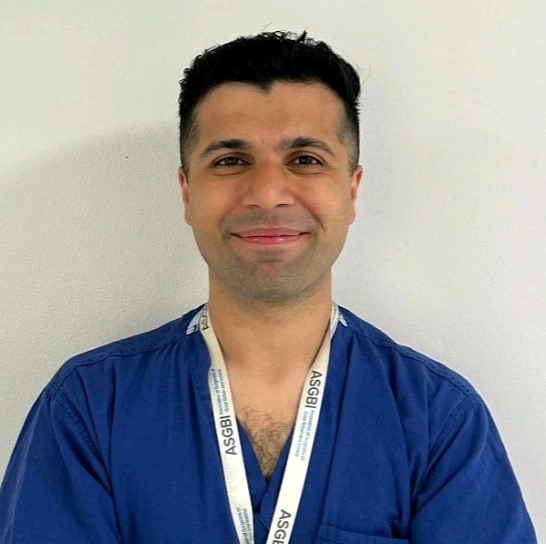
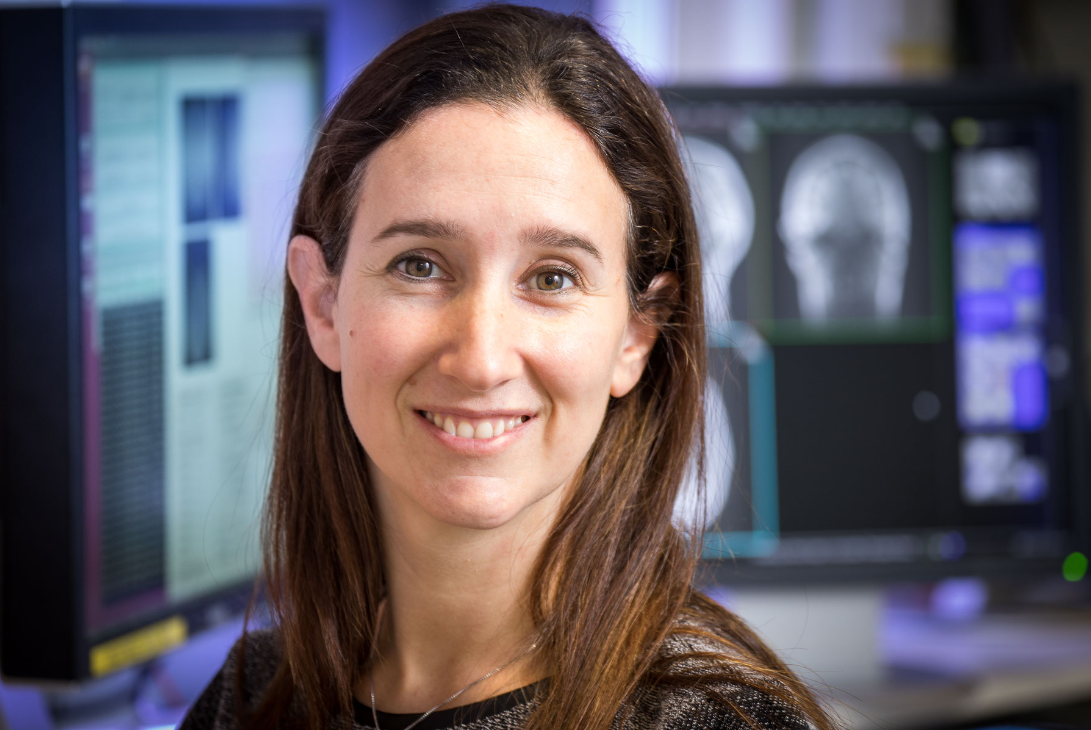
Dr Rebecca Preston, University of Manchester
Extracellular matrix biomarkers for early detection of kidney disease
Chronic kidney disease (CKD) affects millions worldwide and often goes undetected until it has progressed significantly, leading to kidney fibrosis and kidney failure. Current diagnostic tools, such as urine tests and kidney biopsies, are either too late or too invasive. Dr Preston’s research aims to understand kidney matrix dynamics and revolutionise how they detect and monitor kidney fibrosis by developing a non-invasive blood test that can detect kidney disease earlier. Using a mouse model of Alport syndrome, a genetic kidney disease, they have identified specific fragments of kidney matrix proteins that are altered during disease progression. These fragments, released into the bloodstream as fibrosis develops, could serve as powerful early biomarkers. By combining advanced proteomics and a novel technique called peptide location fingerprinting, they will develop a high-sensitivity panel of matrix fragment biomarkers. This panel will then be validated in human blood samples from patients with Alport syndrome and other fibrotic kidney diseases. Ultimately, this work could enable earlier diagnosis, better risk prediction, and more personalised treatment for CKD patients. The findings may also help improve patient selection for clinical trials, monitor their response to treatment and accelerate the development of new therapies for patients with kidney disease.
-
Philip Baker grant to assist research into Ménière’s disease




Dr Henry Dunne, Cambridge University Hospital Trust
HEAD position sensing for the particle repositioning manoeuvre technique in benign paroxysmal positional vertigo: A validation and feasibility study (HEADSPIN)
Dr Dunne’s research seeks to develop and test a new medical device and app which are designed to support clinicians to treat a condition called Benign Paroxysmal Positional Vertigo (BPPV).
BPPV is the most common cause of vertigo. It is caused by debris floating within the inner ear. Movement of the debris as the head moves (e.g. turning over in bed) leads to sensation of spinning; this can increase risk of falls, limit activity, induce anxiety, and lead to hospitalisation.
The treatment for BPPV is a manoeuvre called the particle repositioning manoeuvre (PRM), whereby a clinician moves a patient through a series of positions with the aim of freeing the debris from the inner ear. Correctly performing the manoeuvre has a very high cure rate.
Currently the manoeuvre tends only to be performed by experienced ENT and vestibular specialists. By providing a device that supports other clinicians to perform this treatment, they hope to expand access to the treatment.
Their device is designed as a headband that monitors the position of a patient’s head-in-space which is displayed to a clinician on a screen. Thanks to previous research, from this information they predict the orientation of the inner ear balance organs. As the patient is moved through the positions of the PRM, the clinicians can use the display to ensure they are correctly positioning the patient and dislodging any debris.
After optimising their device and app, they will test them in a group of patients who have BPPV and gain feedback on their usability from key clinical stakeholders.
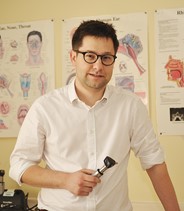
Dr Michael Mather, Newcastle University
Spatial transcriptomic mapping of human endolymphatic sac
Meniere’s disease causes hearing loss, tinnitus, and dizziness. It is thought to be due to excessive fluid in a part of the ear called the endolymphatic sac (ELS). Historically, this has been challenging to research due to the closed anatomical location of the ELS deep in the inner ear. This has made developing new treatments difficult.
In large centres, such as ours, patients are referred with benign tumours on the nerves of hearing and balance. For some, these are best removed using an approach which goes through the ear and would usually result in destruction of the ELS. They propose to sample the ELS from patients undergoing this procedure. They will then use advanced technologies in the lab to generate a readout of which genes are active in each individual cell in the sample, whilst also preserving the structural information about the ELS.
This will provide a world-first tissue atlas of normal human endolymphatic sac, which will be a pivotal resource to help understand the cells present and the genes which control their function. This will provide researchers with a reference to understand the normal anatomy and function of the ELS to later understand what goes wrong in Meniere’s disease.

Mr Matthew Smith, University of Exeter
VR2: Vestibular rehabilitation based in virtual reality
Mr Smith’s past research showed that people with Meniere's disease, an inner ear disorder, have different balance abilities compared to healthy individuals, especially when standing on a vibrating surface.
Now, his research will explore how specific environments and situations affect people with Meniere's. Hie team will use 360-degree videos and motion data to create immersive experiences. First, they will talk to people with Meniere's to understand which environments and scenarios they find particularly challenging due to their symptoms.
Then, using virtual reality (VR) headsets and a moving platform, they will recreate these difficult environments. Standing on a moving train, navigating a bustling supermarket, or crossing a wobbly bridge - they will bring these experiences to our participants, including the sights, sounds, and movements.
By immersing participants in these virtual environments and measuring changes in their balance control, visual focus, and Meniere's symptoms, they aim to understand what specific stimuli make these environments so difficult to navigate. They also hope to identify any coping mechanisms that could help improve their balance control in real-world situations.
-
The James Trust grant to assist research into asthma



Dr Eleanor Quek, Imperial College London
Nasal eosinophil peroxidase (EPX) for asthma diagnosis (LADS-EPX study)
Asthma is a complex and heterogeneous disease, often posing diagnostic challenges. The most common subtype, type 2 (T2) high asthma, is driven by eosinophilic airway inflammation, the identification of which is crucial for predicting treatment response to inhaled corticosteroids and T2 biologics. Current surrogate markers, such as blood eosinophil counts (BEC) and fractional exhaled nitric oxide (FeNO), have suboptimal diagnostic sensitivity and can be confounded by factors such as inhaled corticosteroid use.
Their project aims to evaluate a novel, non-invasive biomarker, nasal eosinophil peroxidase (EPX). Using highly sensitive ELISA assays, they will quantify nasal EPX in nasosorption samples from participants enrolling in the London Asthma Diagnostics Study (ClinicalTrials.gov ID NCT02660489). Dr Quek’s research aims to assess the diagnostic accuracy of nasal EPX against an adjudicated diagnosis of asthma as per NICE/BTS/SIGN guidelines. By identifying a novel, patient-friendly biomarker, this research has the potential to improve early disease endotyping, ensuring early and targeted treatment for asthma patients at the point of diagnosis.
-
TP Gunton grant to assist research into public health relating to cancer



Dr Yin Zhou, Queen Mary University of London
I-FLOW: Improving follow-up of test results for possible prostate, ovarian and colorectal
cancer in primary careTo achieve the NHS Long Term plan of increasing early-stage cancers diagnosed from 55% to 75% by 2028, it is vital that we improve the diagnostic process for patients who present in primary care, as 90% of the NHS diagnostic activity occurs in primary care and the majority of cancers are diagnosed following presentation to GPs. Reducing delays in the follow-up of test results in primary care therefore has huge potential to improve cancer outcomes and experience.
Despite national guidelines supporting GPs in making referrals decisions when cancer is suspected, missed opportunities continue to exist. US evidence suggest that abnormal cancer test results are not always followed up in a timely way, leading to delayed referral for further investigations and diagnosis, negatively affecting treatments and survival.
This retrospective linked study will use national primary care, secondary care and Cancer Registry data to find out (1) how often and in whom delayed/non-follow up of abnormal cancer tests occur, and (2) the impact of delays and misses on cancer stage and survival, for three cancer-specific tests commonly performed in English primary care. These include faecal immunochemical test, prostate-specific antigen, and Ca-125 for colorectal, prostate and ovarian cancer respectively. Findings will inform future research to study how and why delays and missed test follow-up occur, develop targeted interventions to reduce missed diagnostic opportunities, aiming to achieve more timely diagnosis and ultimately improved cancer outcomes.
-
The Sherman Fund grant to assist research into mental health in Wales




Dr Hassan Awan, Keele University and Dr Mohammed Mustafa, Cardiff University
The role of faith leaders in supporting the mental health of Muslim men in Wales, a co-design study
Disparities in mental health outcomes disproportionately affect Muslims in Wales. When accessing psychological therapies Muslims experience poorer outcomes, lower improvement rates, and higher drop-out rates. Faith leaders often serve as initial points of contact for Muslim men seeking mental health support, yet typically lack formal training in recognising and addressing these needs.
This 12-month co-design study will develop, implement, and evaluate a culturally-centred mental health training program for Muslim faith leaders in Wales, combining Islamic principles of Irshad Tazkiyat Care (self-purification and growth) with evidence-based mental health practices.
Using mixed-methods participatory action research, the project will:
- Interview faith leaders about their experiences supporting Muslim men's mental health.
- Co-design workshop content with a Patient Advisory Group of Muslim men with lived experience and faith leaders.
- Deliver three workshops to 15 faith leaders.
- Evaluate changes in knowledge, confidence, and skills of faith leaders.
This research will deliver transformative outputs: a comprehensive training package equipping faith leaders with the knowledge and skills for culturally relevant support and appropriate onward referral; high-impact publications; community resources; policy recommendations; and lasting partnerships between faith leaders and healthcare services. This project will create sustainable models adaptable to other underserved communities beyond Wales.
-
Vera Down grant to assist research into neurological disorders




Dr Hina Khan, University of Sheffield
Ethnographic study of pathways to dementia diagnosis for ethnic minorities
Dr Khan an Honorary Senior Clinical Lecturer at the University of Sheffield and a fully trained Neurologist, previously an NIHR Clinical Research Fellow at the Sheffield Institute of Translational Research (SITraN). Her research focuses on early diagnostic biomarkers for Alzheimer’s disease (AD) and dementia, particularly in underserved communities. She contributes to the CognoSpeak team, developing AI-based digital cognitive assessments, and has led engagement with Somali, Chinese, and South Asian communities, training Research Champions and promoting brain health awareness. Building on her ARUK pilot grant, she is extending this work to Bradford’s South Asian populations, co-producing culturally tailored resources on modifiable dementia risk factors.
The BMA Vera Down proposal outlines an ethnographic study investigating barriers and facilitators to timely dementia diagnosis for South Asian and Black minority ethnic (ME) communities in Sheffield, who face disproportionate delays in accessing Memory Assessment Services (MAS) due to stigma, lack of awareness, language barriers, and limited culturally sensitive services. The study combines a meta-ethnographic literature synthesis and sense-checking focus groups with 18–20 ethnographic case studies of ME service users, families, and clinicians. Outcomes include a blueprint for equitable MAS pathways and culturally tailored strategies to improve early diagnosis, informing an NIHR HSDR bid to co-produce an inclusive community memory clinic.

Dr Sophie Adler, UCL Great Ormond Street Institute of Child Health
Transforming neuroimaging of SCN1A-related epilepsies
Neurodevelopmental epilepsies, such as SCN1A-related epilepsy, are a group of debilitating neurological disorders affecting millions of children and adults worldwide. Despite considerable advances in understanding their genetic basis, the interactions between genetics, brain development, and symptoms remain unclear. Furthermore, while gene therapies are showing early promise, lack of precise tools to monitor their effects on the developing brain.
Parents express a sense of frustration that their child has complex epilepsy and yet their brain MRI scan is ostensibly “normal”.
The explosion in genetic testing, enabling the identification of large cohorts of patients with SCN1A mutations, coupled with the advances in bioinformatics, neuroimaging and medical AI, create a unique opportunity to characterise disrupted brain development in SCN1A-related epilepsy.
In this project, 400 MRI scans of children with SCN1A-related epilepsy will be collected. Using normative growth charts of healthy brain development created from 35,000 MRI scans, the team will quantify abnormal neurodevelopment in children with SCN1A-related epilepsy and link this to both the underlying genetic biology and individual patient symptoms.
The tools for characterising brain changes in individuals with SCN1A mutations may provide biomarkers for monitoring response to emerging gene therapies. Although tailored to SCN1A-related epilepsy, these tools will extend to broader applications, including diverse neurodevelopmental and neurodegenerative disorders.
-
MEDFASH prize in recognition of work which has improved the quality of HIV and/or sexual healthcare in the UK




LUSTRUM2 is a continuation of the original LUSTRUM research programme (2016–2021), a five-year NIHR-funded study that focused on improving sexual health through more effective partner notification strategies, particularly accelerated partner therapy (APT) for STIs such as chlamydia. Building on LUSTRUM’s findings, LUSTRUM2 was co-led by Prof. Claudia Estcourt and Dr Jen MacDonald to improve the uptake of STI testing among sex partners following contact tracing through developing targeted and tailored digital interventions.
Central to LUSTRUM2 was the co-production of short films, led by Dr Melvina Woode Owusu, who provided leadership on co-production and inclusion, together with 17 co-producers who played an instrumental role in shaping the work. Working alongside young people and community members—particularly those from groups disproportionately affected by STIs, such as Black Caribbean youth—the team created three culturally attuned short films. These films were designed to encourage partners to test, reduce stigma, and provide relatable, inclusive messages that reflected diverse social and cultural backgrounds. The films were complemented by a practical clinical implementation toolkit, ensuring they could be embedded in sexual health services and online resources.
The study was carried out in close collaboration with sexual health professionals, community organisations, and film/media experts to ensure the interventions were accessible, engaging, and grounded in lived experience. Importantly, the work is formally endorsed by BASHH (the British Association for Sexual Health and HIV), reflecting its sector-wide credibility and impact.
-
BMA Foundation for Medical Research
For more information, please get in touch:
Corporate development, British Medical Association, Tavistock Square, London, WC1H 9JP
Tel: 0207 383 6341
Email the team: researchgrants@bma.org.uk



